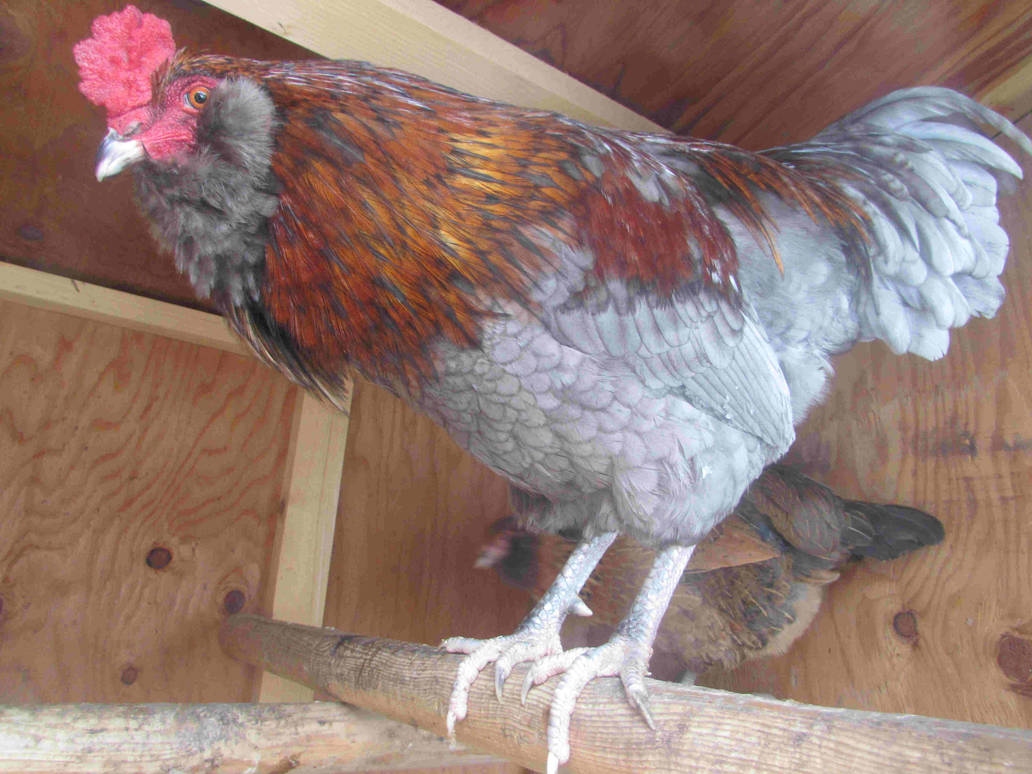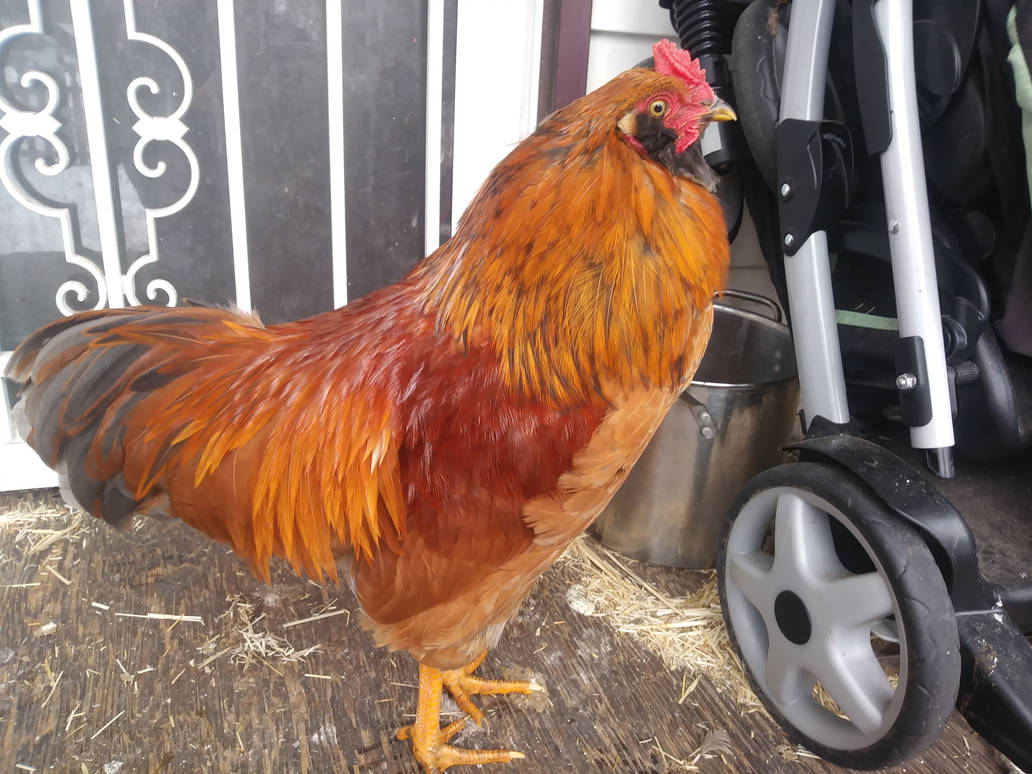
Olive Egger Rooster (Photo by Louis Stevens-Fish)
They are extra
Roosters. Time to give them a chance. Everyone has an opinion on them. Some love the classic image of a handsomely plumed boy strutting around the barnyard while others will get out the stew pot as soon as they hear the first strangled crows from the most recent batch of chicks. The problem with roosters is, you don’t need them to make eggs. They’re extra. Just a bit of extra ornamentation that eats your feed and your bottom line, and worse, they can be loud and aggressive. So what’s the point of keeping a rooster?
I’ve had a few roosters since I first started keeping chickens, and while a rooster might not fit into everyone’s plans, I’m here to make the case for them.
Fertilize eggs… so what?
So, what does a rooster do, other than eat, poop, and fight? Well, the obvious answer is mate with hens, but that might not be a good enough reason to keep a couple in your flock. While a fertilized egg is no different than an unfertilized one in taste, it can decrease the shelf life–up to two weeks according to some estimates I’ve found. And even if you do want new baby chicks on demand, you still won’t get them unless you have a broody hen willing to set them, or an incubator. Does a rooster bring anything else to the table? Yes, a lot of things, as it turns out.
Social Animals
Chickens are social animals. They need a flock to be happy and thrive, and this is where roosters begin to play an integral role. Part of being in a flock is knowing your place in the pecking order. It’s called that because that’s how hens enforce their social standing: pecking any other chickens lower than them. It’s harsh, but them’s the breaks. Usually, if a new bird is introduced or an old one taken away, there will be a bit of scuffling as hens try to suss out if the new order is going to change or stay the same. It can get brutal; chickens are known to resort to cannibalism in some cases though that’s far more common in a flock that is over-crowded, bored or stressed. Occasionally, you can just get a bad egg with a mean streak.
One thing I have observed with a flock that has a rooster, compared to a rooster-less flock, is that the pecking is a lot less severe, and of shorter duration. Just recently I had to introduce a very young pullet into my established laying flock much sooner than I had intended due to an extreme cold snap in the weather. I couldn’t leave her in the out-grown coop with no one to keep her warm when overnight lows were dipping into the negatives numbers. So into the big coop with all the older hens she went. And while she did get pecked sometimes while feeding, I observed her huddled with my Olive Egger boy most of the time. The older girls would walk over and inspect, but none of them would try to peck her so long as the rooster was watching. And they had settled quite happily within a couple days- much faster than I have observed in rooster-less flocks. The rooster appears to play an important role in flock social dynamics, keeping everything orderly and allowing no more infighting among the hens than necessary.
Good providers
They’re also good providers. A rooster will forage food and call the hens over for any tasty treats he finds, and he’ll do this for chicks as well! Often he will stand and observe, politely waiting his turn, all while keeping an eye out for any trouble.
Of course they don’t just protect the flock from internal strife; they defend the flock from outside forces as well. Roosters have different calls for when they spot a predator, if the threat is coming from the ground or the sky. Something hawk shaped will get the alarm for an aerial attack, telling the rest of the flock to get under cover, while a fuzzy body creeping along the ground will trigger a warning to fly up and scatter into the trees. In the worst case scenario, a rooster will fight back, either fending off the threat with those very sharp spurs, or even sacrificing himself to give his flock a chance to get away.
Roosters are more than pretty faces with an attitude. I firmly believe that a good rooster is worth the price in feed. He completes the flock dynamic, fulfilling valuable social roles in keeping order and protecting the vulnerable. If given the opportunity, I will always choose to keep at least one rooster, and I think it may be high time more people reconsider that stew pot.

What a gorgeous boy (Photo by Louis Stevens-Fish)
(Though being pretty certainly doesn’t hurt).
Louis Stevens-Fish Bio: Our chicken flock is mixed; two Easter Eggers, a Barred Rock, an Austrlorp and one Olive Egger rooster that was of course the only survivor out of a straight run of three I bought back in March. I’ve kept Welsummers, Cuckoo Marans, Wyandottes, Orpingtons and other EEs and of all of them I think the EEs are my favorite. I love their fluffy faces, they’re the friendliest of birds, and my most consistent, and prolific layers. My older EE hen was the first to start laying this year, right on February 1st when it was still mostly dark and cold as the arctic!













9 Comments
I had a beat up rooster show up. He was a bloody mess. I put him in a box and started healing all of his sores. Got him healthy. He was a wonderful guy. I have sheep and he would stay with the baby lambs and let the mamas go out and eat. When the lambs got big enough he would go graze with them in the pasture. When I would whistle for the crew to come back to the house Henry would jump up on the back of one of the sheep and ride it It was so funny. People would stop their cars to watch him flap his wings to keep his balance. He finally died of old age but was a really good guy. Took care of his flock of sheep really well.
I’d love to see a picture of that!
I wasn’t too happy that a pullet I paid extra for turned out to be a rooster. He would always seem to rush me when I’d go in the coop to check them. But one of our pullets has a crooked foot problem, she can walk but can’t hang on to roost. “Rambo” has won my heart because he sleeps on the floor with this pullet even if he would have no problem flying up and staying on the roost.
#roostersgetabumrap
Thank you, thank you for pointing out the many social and practical benefits of having roosters around and not immediately executing them when they show up in your batch of chicks. I was terrified that I would get a rooster because of all the misinformation I had heard, particularly that he would attempt to kill me in some gruesome way as soon as I came near! Billy has been a delightful guy who started strutting his stuff and acting cocky way before I would have expected the secondary characteristics to show, and he was always watchful over everyone’s behavior, even when they were little. I have never had a problem with him as far as aggression (although he does seem to think my scooper shovel is Satan incarnate so you have to be careful when cleaning up that you aren’t pecked by mistake) and I enjoy his super soft shoe dance when he’s trying to impress the ladies. Of course, he also does that with me so I’m not sure exactly what that means; I’m guessing I shouldn’t spend too much time trying to interpret that one- lol. Billy has been so nice that his hens started pecking at his preening gland and he allowed it to continue until he sustained some major injuries. They still go after him when I let him into the group so I have him put in a kennel in the middle of the coop, not ideal but safe for the moment. I am getting a far bigger coop so there is no possibility of stress from what they might consider too close of quarters and try again, my point being that assuming a rooster is aggressive with everyone person or hen is just not so. He is beautiful, useful, and provides a lot of social coherence when he isn’t being gang attacked. Thanks again-
We’ve had roosters in our flock as long as we’ve had hens, thanks to sexing errors at the hatchery for our initial 4 chicks. Nature took its course, and at one time, we had 15 chickens, 6 of which were roosters. But for the most part, all the roosters got along, with each one having a couple of hens for his flock. In all that time, only 1 rooster was mean.
We recently moved, and the chickens hang out much, much closer to our bedroom. The rooster alarm got to be pretty annoying. But then we discovered a ‘crow collar’. It reduces the incidence of crowing, and the crowing is at a much lower volume. Our rooster got used to it very quickly, and it didn’t seem to annoy him. For those that cringe at the thought of waking up to a rooster crowing, or disliking the crowing all day long, you can find them on the internet.
Totally agree… I have two of the sweetest roosters. They take great care of the girls. So entertaining to watch them. When I feed them scraps they make sure the ladies get fed before they eat and always watching out for danger. I love them and they are beautiful.
I could not agree more! Roosters are essential to a healthy flock especially in the heritage breeds. Our Old English Game Roo is friendly, an excellent husband, a great guardian of little ones, and a fierce protector! We actually saw him stand up to a large red fox that was coming after his hens! Thankfully my husband got there before the fight became physical or our boy would have given up his life for his girls!
I agree with all that you said and I have a rooster right now who exemplifies all those traits – I particularly like that he always defers to the ladies when I put something delicious in the compost pile. My only concern in keeping him is that I noticed that his favorite girls are losing feathers to the point of having bare skin on their backs! I’ve seen that kind of exposure lead to even more severe pecking in the house at night. Any suggestions to alleviate that situation?
Hi Alan, there are actually chicken aprons exactly for this! You can find them all over; feed stores, Amazon- you can even make your own if you’re handy with a sewing machine.